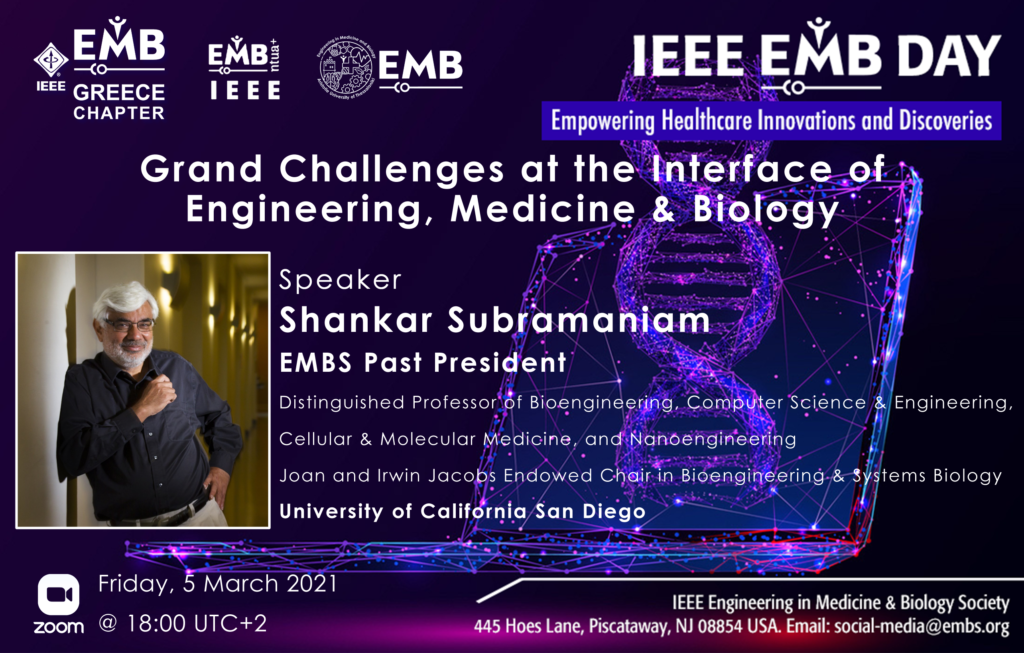Grand Challenges at the Interface of Engineering, Medicine & Biology

Grand Challenges at the Interface of Engineering, Medicine & Biology
We are celebrating IEEE EMB Day 2021!
Join us and Shankar Subramaniam, EMBS Past President, for a live webinar on Friday 05 March 2021, at 18.00 UTC+2 (EET).
The event is co-organised with IEEE EMB NTUA Chapter and IEEE EMB AUTh Chapter.
You can register here for free.
Abstract
Over the past two decades Biomedical Engineering has emerged as a major discipline that bridges societal needs of human health care with development of novel engineering methods and technologies. Every medical institution is now equipped with technologies at varying degrees of sophistication monitoring human health in both non-invasive and invasive modes. The multiple scales at which human physiology can be interrogated is providing a profound perspective on health and diseases. We are at the nexus of creating “avatars” of human physiology and pathophysiology to serve as paradigms for exploration and intervention. I present here five grand challenges with cross-cutting themes and provide a roadmap for new technologies, new training needs and the types of interdisciplinary teams needed for addressing these challenges. The themes include development of smart and responsive devices for human function augmentation, accumedicine through creation of avatars of cells, tissues, organs and whole human, development of exocortical technologies for understanding brain function and addressing neuropathologies, novel strategies for engineering genomes, and development of approaches for harnessing the human immune system for health and wellness. I will provide exemplars from research in our laboratory.
Short Bio
Shankar Subramaniam is a Distinguished Professor of Bioengineering, Computer Science and Engineering, Cellular and Molecular Medicine, Computer Science and Engineering and Nano Engineering. He was the Chair of the Bioengineering Department at the University of California at San Diego (2008-13). He holds the inaugural Joan and Irwin Jacobs Endowed Chair in Bioengineering and Systems Biology. He was the Founding Director of the Bioinformatics Graduate Program at the University of California at San Diego. Prior to moving to UC San Diego, Dr. Subramaniam was a Professor of Biophysics, Biochemistry, Molecular and Integrative Physiology, Chemical Engineering and Electrical and Computer Engineering at the University of Illinois at Urbana-Champaign (UIUC).
In 2020 he was elected as a Fellow of IAMBE and in 2013 he was elected as a Fellow of AAAS. In 2002 he received the Genome Technology All Star Award. He is a fellow of the AIMBE and is a recipient of Smithsonian Foundation and Association of Laboratory Automation Awards and his research work is described below. In 2019 he was elected as the diamond jubilee distinguished alumni by the Indian Institute of Technology Kanpur. In 2008 he was awarded the Faculty Excellence in Research Award at the University of California at San Diego. In 2011 he was appointed as a Distinguished Scientist at the San Diego Supercomputer Center. He has served on the External Advisory Boards for several Bio/Biomedical Engineering Departments including Johns Hopkins U., Case Western Reserve U., U. Penn, Rice U., and UT Austin. He is currently an overseas advisor for the Department of Biotechnology of the Government of India. In 2012, he was elected as the Chair of the College of Fellows of AIMBE. He also serves on the Scientific Advisory Board of Janssen Pharmaceuticals (the research arm of Johnson and Johnson). He has served on the Scientific Councils of NIGMS and NHGRI (NIH Institutes) and as a Chair of three distinct study sections at the National Institutes of Health. Subramaniam has graduated over 80 Ph.D. students who occupy leading academic and industrial positions. He has trained over 100 postdoctoral researchers. His research is funded by the National Institutes of Health, National Science Foundation, the Wellcome Trust, and the Chen Foundation.
Subramaniam’s innovative work has major impact on research and development in academia and industry by allowing the synthesis of complex biological and medical information from genes and molecules into integrated knowledge at cellular and system levels, thus providing important basis for drug discovery and innovation. He was a pioneer in bioinformatics with his development of the Biology Workbench, the first of its kind in web based infrastructures. He has fostered training and research in systems biology and bioinformatics at the national level, serving on the NIH Director’s Advisory Committee on Bioinformatics and played a key role in the formulation of the NIH Director’s Roadmap which places a major emphasis on the use of quantitative approaches of engineering to biomedical research in health and disease. He has been instrumental in raising national awareness of the roles of these engineering approaches to biomedical research. He founded the UCSD Bioinformatics program and was Chair of the nationally top-ranked bioengineering program from 2008-2013. Subramaniam has collaborated with colleagues in clinical medicine to elucidate the molecular and genomic basis of the pathogenesis of diabetes, inflammation, atherosclerosis, and myopathies by using modern approaches of systems biology and bioinformatics to analyze physiological and pathophysiological data, leading to the development of novel therapeutic measures and drug discovery.
Subramaniam has made innovative contributions at the interface of engineering and medicine. In addition to inventing new methods for analysis of complex systems, he pioneered a novel technology for RNA sequencing with the smallest quantities of RNA leading to our ability to analyze human tissues at the microscale. His contributions to models of human disease are wide and profound and have strong implications for precision and personalized systems medicine.


